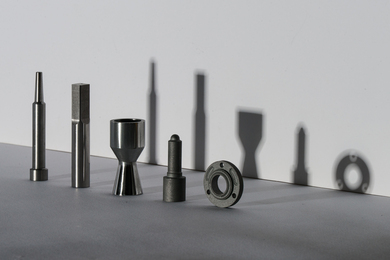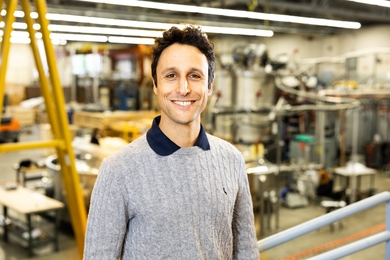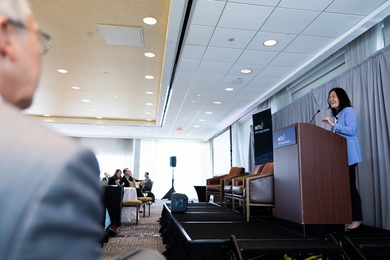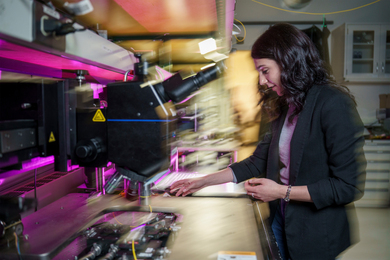With a $100 million gift from David H. Koch (S.B. 1962, S.M. 1963), one of the largest gifts in Institute history, MIT plans to build a new cancer research center that will bring together scientists and engineers under one roof to develop new and powerful ways to detect, diagnose, treat and manage cancer.
The David H. Koch Institute for Integrative Cancer Research--the cornerstone of a major research initiative comparable to MIT's spearheading the development of radar technology in World War II--will be housed in a new state-of-the-art cancer research facility, scheduled to open in 2010.
The new Koch Institute will build on the pioneering research of MIT's Center for Cancer Research (CCR), founded by Nobel Prize winner Salvador E. Luria in 1974, and will bring to the next level MIT's longstanding commitment to unraveling the molecular core of the disease.
"The David H. Koch Institute for Integrative Cancer Research will harness the power of MIT scientists and engineers to address one of the most pressing challenges to human health: the ultimate eradication of cancer, starting with real improvements in detection, treatment and prevention," said MIT President Susan Hockfield.
"David Koch's extraordinary generosity will make possible a level of collaborative, cross-disciplinary research and training unparalleled in the world. The convergence of life sciences and engineering enabled by his gift will chart a new course for cancer research, for which we are deeply grateful," she said.
The $100 million gift is the fifth largest in MIT's history. Ground will be broken for the new building, which will be located next to the David H. Koch Biology Building and across Main Street from the Broad Institute, in March 2008.
What makes the new institute unique is the concept of pooling MIT's molecular geneticists and cell biologists with engineers.
"This is a new approach to cancer research with the potential to uncover breakthroughs in therapies and diagnostics," Koch said. "Conquering cancer will require multidisciplined initiatives and MIT is positioned to enable that collaboration. As a cancer survivor, I feel especially fortunate to be able to help advance this effort."
The new institute will house the laboratories of approximately 25 MIT faculty members, including a blend of faculty from the School of Science and the School of Engineering. Among the scientists are Angelika Amon, winner of the Waterman Award from the National Science Foundation as the nation's top young scientist or engineer, and Phillip Sharp, winner of the 1993 Nobel Prize in physiology or medicine.
"The word 'integrative' in the name of the Koch Institute is the key to the vision of its establishment. It speaks volumes about where cancer research is heading, and I'm really excited to be a part of it," said Sharp.
Engineering faculty include Angela Belcher, a MacArthur Award winner who was named Scientific American's Researcher of the Year in 2006. MIT Institute Professor Robert Langer will also conduct his engineering research within the new Koch Institute. Langer's collaborative research efforts have led to numerous patented discoveries and novel ways to improve the clinical management of cancer. He was awarded the 2006 National Medal of Science.
"The Koch Institute will pursue a bold new direction in cancer research, one that holds great promise for our ability to more effectively control this disease," said John E. Niederhuber, director of the National Cancer Institute. "MIT has played a critical role in defining the molecular era of cancer research. With the Koch Institute, MIT is poised to chart a powerful new course in a rapidly developing era that will require the skills of the engineering disciplines, physical sciences, and of mathematics and physics, in addition to the biological sciences."
Building on the advances in traditional areas of cancer exploration such as molecular genetics and cellular biology, the state-of-the-art facility will focus on five target areas of research at the intersection of biology and engineering.
Tyler Jacks, the David H. Koch Professor of Biology at MIT and current director of CCR, will serve as the director of the Koch Institute at MIT.
"By housing leading cancer biologists with world-class engineers, we are creating a formidable team motivated to understand cancer and to do something about it. We expect to rapidly deliver important new tools for oncologists and their patients," Jacks said.
"Our goal is to make the David H. Koch Institute for Integrative Cancer Research the gold standard in interdisciplinary disease-focused research. Our organization will build an expanding and highly effective relationship network that also involves other academic oncology centers, industrial partners and cancer-focused foundations. Together we will dramatically expand our research and training efforts and seek to deliver powerful clinical solutions," he said.
The new institute will be equipped with the most sophisticated research tools currently available, including bioinformatics and computing, genomics, proteomics, flow cytometry, large-scale cell and animal facilities for genetic engineering and testing, advanced imaging equipment and nanomaterials characterization labs.
Koch, who holds bachelor's and master's degrees in chemical engineering from MIT, is an executive vice president and board member of Koch Industries. Koch has personally pledged and contributed more than $400 million to a wide variety of organizations and programs that further cancer research, enhance medical centers and support educational institutions, and sustain arts and cultural institutions. His contributions to MIT have established the David H. Koch School of Chemical Engineering Practice, and he has been honored with the dedication of the David H. Koch Biology Building at the university.
A version of this article appeared in MIT Tech Talk on October 17, 2007 (download PDF).





